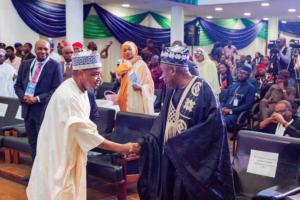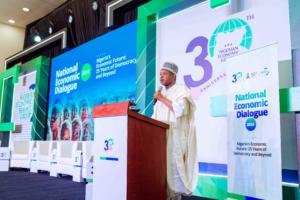Honourable ministers, ambassadors, distinguished participants from the private and public sectors, the Permanent Secretary of the Ministry of Budget and Economic Planning, members of the media, good morning, everyone.
Let me join Olaniyi Yusuf, the Chairman of the NESG, in welcoming all of you to what is no doubt a stimulating topic to discuss, especially given that we are reflecting on the past 25 years since 1999 and the next 25 years if one is to take our agenda 2050 as the  operative document. Certainly, we have players from all sectors of national life who can contribute to this discussion.
operative document. Certainly, we have players from all sectors of national life who can contribute to this discussion.
We especially have ambassadors from countries that I’m sure have also witnessed some of the issues we have witnessed or are witnessing or learning from. And this is happening today, slightly one year after President Bola Ahmed Tinubu took office. We have heard Olaniyi Yusuf. We have heard most of the comments, and almost all are correct. We appreciate that the NESG has, over the years, become a force to reckon with in partnership with the Budget and Economic Planning Ministry. Ever since they started, they recognised that it’s not a monologue.
It’s not just staying out and criticising but joining hands and improving things. So, I must congratulate their vision, and I must congratulate all of us Nigerians. Indeed, in the last 25 years, a lot has been witnessed.
President Bola Ahmed Tinubu has been very reluctant to reflect on the past and blame anybody, but the net effect is that despite efforts by previous administrations, especially in the last 25 years, we are not where we want to be.
So, what do we do? It’s not because of anyone’s failing, but that is our reality. We have yet to achieve the income per capita that we require, and it’s not for lack of trying; it’s not for lack of successes, some of which have been mentioned by Olaniyi Yusuf. With the transformation in the telecommunication sector, at some point, we even reversed our GDP. Our population has grown from 119 million in 1999 to about 230 million, almost double. Still, our oil production, for example, 2.2 million barrels in 1999, is now rather than 4 million, according to the doubling of our population, which is still under 1.5 million, reflecting cumulative years of underinvestment in the sector.
So, our reality is that we are not where we want to be, and our constitution needs to be more transparent about what we should do. Chapter 2 of our Constitution, the Fundamental Objectives and Directive Principles of State Policy, clearly discusses the country’s political objectives. It is also very clear about the economic objectives—what kind of economy we want to run.
Chapter two of the Constitution spelts out citizens’ duties. The chapter opens by saying that all persons in authority, legislative, executive, and judicial, at all levels of government, have the primary mandate to ensure the achievement of those fundamental objectives in Chapter 2.
So, the constitution—maybe we can interrogate it and make it better—provides a starting point. Agenda 2050 reflects those objectives. We w ant a nation that includes all. We want a higher per capita by the year 2050. We want to ensure that we invest not less than $100 billion annually. But if our experience in the last 25 years should serve us as a guide, we sometimes know how difficult it is because you have to make choices that are both pleasant and unpleasant to be able to mobilise capital, private and borrowed capital, to support our aspiration. We need more public resources to fund our priorities. And that is one of the things. I remember that in 2015, the NESG even took the manifesto of the All Progressives Congress and attempted to cost it.
ant a nation that includes all. We want a higher per capita by the year 2050. We want to ensure that we invest not less than $100 billion annually. But if our experience in the last 25 years should serve us as a guide, we sometimes know how difficult it is because you have to make choices that are both pleasant and unpleasant to be able to mobilise capital, private and borrowed capital, to support our aspiration. We need more public resources to fund our priorities. And that is one of the things. I remember that in 2015, the NESG even took the manifesto of the All Progressives Congress and attempted to cost it.
If we are to provide for what we can pay, this is what it costs. And it’s in terms of money way above what was available to us. So, I know this is an opening remark. We are not where we want to be. That’s why, after 25 years of constitutional democracy, we are a federal democracy, which requires minimum cooperation among all the tiers of government. Some achievements in the last 25 years reflect the ability or the post cooperation sometimes between the tiers of government.
That is how we are able, for example, to fund the Niger Delta Power Plants, which is a cooperative investment among federal, state and local governments. So, even in a constitutional democracy, where all tiers are separate, our constitution and our planning process require a minimum of cooperation between the levels of government and the private sector.
But we are not lamenting. We are willing to take the bull by the horns. We have a president today who, as God will have it, has actively participated in the last 25 years that are under review. Among his achievements was that he ran a state with the largest economy in the country. He tried some of the ideas that he’s inviting us to take on at the national level, meaning ideas that we have to support our dreams, the private sector willing to take risks, put money to work, create capital, and create employment.
We must not ignore those for whom the social contract between them and society is weak. That is why, in Lagos, those who lived there before 1999 know a time when young men and women of the area interrupted normal daily life because they were otherwise angry and felt excluded. The government under the president, then governor Tinubu, made a deliberate effort to include them. That broad spectrum of supporting dreamers while including others is also required at the national level to transform and support innovation.
 We are equally blessed that Mr President is supported by a vice president who, as a governor of Borno State, has seen what it means if it fails. A combination of environmental issues, convoluted reasons, and failure to include past enough made a significant number of angry people take off weapons, literally, against all of us.
We are equally blessed that Mr President is supported by a vice president who, as a governor of Borno State, has seen what it means if it fails. A combination of environmental issues, convoluted reasons, and failure to include past enough made a significant number of angry people take off weapons, literally, against all of us.
This rich experience helped support our strategy’s foundation, the Renewed Hope Agenda. Every moment and every era is unique in its own way. From 1999, different presidents and administrations led uniquely different circumstances, both domestic and international. Ours is no different. We decided that as part of Mr President’s campaign, the Renewed Hope Agenda, let us confront our reality. Let us invite our countrymen and women, supporters, development partners, and friends of Nigeria so that we can mobilize resources that will fund our dreams, so that we can include all, and in doing so, we need to work together.
We need to respect the separation of power and the constitutional arrangement. It’s not a dictatorship; it’s a cooperative federalism. In doing so, we must also make top choices. We have lived with oil subsidies, for example, for decades. And it has harmed us, even when oil prices once went up to $147 in our national life. The net effect on the federation’s revenue, or the availability of investment money to support, was almost nil because the higher the oil prices, the more the then-President Jonathan’s government was spending to support subsidies.
So, we have been living a lie. So, as unpleasant as it is, President Bola Ahmed Tinubu said let’s begin to tell ourselves the truth that we are not as rich as we think we are. It’s not a shame.
Countries that have done that thinking and established that truth much earlier than us have made choices that have taken them where they want to be. Ayo Salami, for example, in the video, said that in 1990, our GDP per capita was higher than that of China. But now, China is multiples. What choices did China make from 1990 to date that we have not made? Maybe that is something that we should be concerned with. They made choices deliberately to ensure that their economy was competitive.
Private market capital is supported in that it can mobilise capital, both domestic and foreign, that it can support. We have also taken that step. Sorry if I speak too much; please forgive me. The ministry is very passionate about this. I know someone else is the guest speaker. But I want to assure everyone we have a Renewed Hope Agenda strategy. And it’s working. We are under no illusion that it will involve tough choices.
That’s why, at every turn, we are looking for resources that can compensate for those tough choices. But we believe, and we are seeing light at the end of the tunnel, that the renewed hope strategy that we have adopted is consistent with Agenda 2050. It’s consistent with Chapter 2 of the Constitution. For us in the Ministry of Budget and Economy Planning, which is squarely responsible for advising the nation on how Chapter 2 is to be implemented, our budget so far is guided by those documents.
We have introduced ministerial realignment in our efforts to innovate. We have created ministries and a creative economy, recognizing the importance of our creative sector. So, Mr President, recognise that we should create a creative economy ministry. We created steel and solid minerals ministries to focus on that potential. We also created the Ministry of Blue and Maritime Economy to show that today’s blue and maritime economy is viable. Even the Lagos-Calabar Highway being constructed supports our maritime and blue economy opportunities. We have also created the Ministry of Livestock because Mr President recognised that livestock is an economic opportunity for Nigeria, not a challenge, not a source of conflict that it was. Still, we have to marshal it as such.
We have created innovative tools and consumer credit. In countries that have achieved growth and development, household debt is a significant component of the economic engine. Nigeria can only grow by doing similar things.
The real estate sector, where we created a renewed hope infrastructure fund, among others, to target the real estate sector, is a recognition of the gross effect of the real estate sector, as well as a catalytic role which CNG investment can play in transiting us from a more expansive PMS economy to the cheaper, more competitive, gas-based economy consistent with our blessing and consistent with the experience of other countries.
I’m sure my colleagues here and those in the ministry will talk about other initiatives. But we have learned that even the current protests have made us listen more. Whatever we are doing, we have taken the message that we need to do more, we need to do better, and we need to do it in a hurry.
The dialogue here will help us.
Thank you very much.
